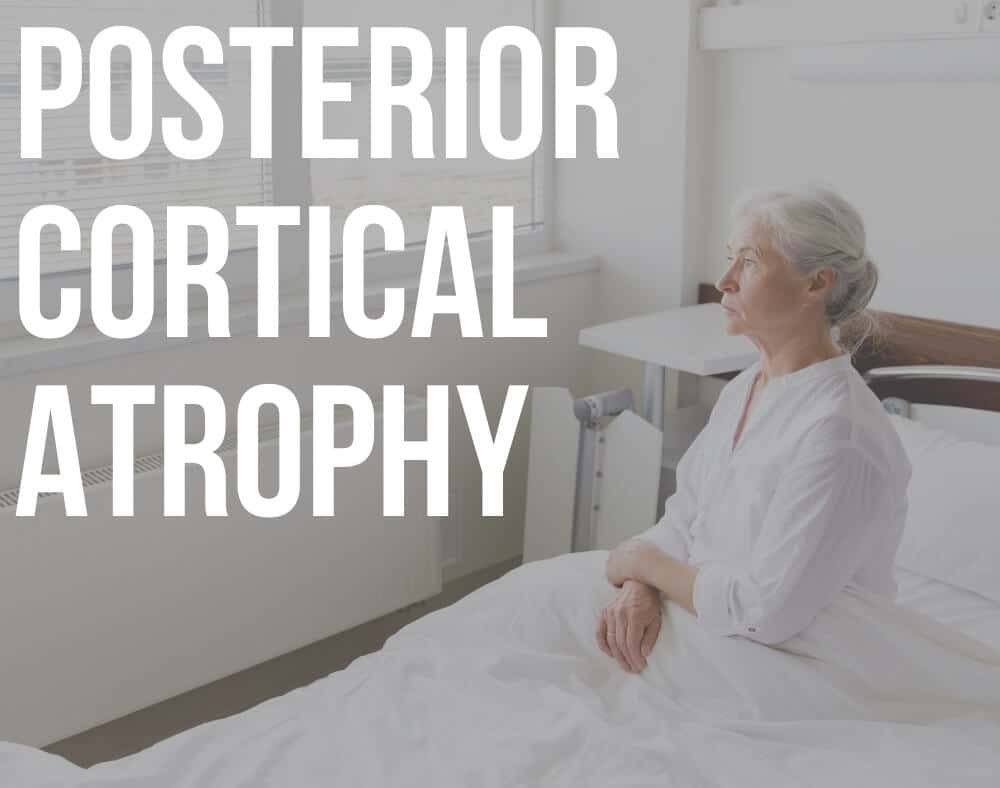Also known as Benson’s syndrome, posterior cortical atrophy (PCA) refers to the progressive and gradual degeneration of the cortex which is the outer layer of the brain in the part of the brain that is located in the posterior (back of the head).
It is the section of the brain that handles the processing of visual information.
Everything about Posterior Cortical Atrophy
PCA was first described in 1988 by D. Frank Benson. It is still not clear whether this is a unique illness or a possible variant form of AD (Alzheimer’s disease).
For most people with PCA, the part of the brain that is affected shows neurofibrillary tangles and amyloid plaques which are similar to the changes that occur in persons with AD but in a different part of the brain.
For other individuals with Benson’s syndrome, the brain changes resemble other illnesses like Creutzfeldt-Jakob disease and Lewy body dementia.
Most cases of PCA usually occur in persons between the ages of 50-65 but the condition can also affect older people.
Causes of PCA

The exact causes of posterior cortical atrophy are still unknown.
There are also no obvious genetic mutations that are linked to the condition.
Nonetheless, discussions are on-going as to whether the risk factors for Alzheimer’s disease are similar to those of PCA.
Symptoms of Posterior Cortical Atrophy

Different people with PCA will experience varying symptoms and this can change as the illness continues to progress.
Common warning signs for this condition include:
- Blurred vision, double vision, difficulties reading and writing, and problems seeing clearly especially in low light conditions
- Increased sensitivity to shiny surfaces or bright light
- Hallucinations
- Challenges performing mathematical calculations
- Problems with spelling
- Anxiety
- Difficulties with visual tasks like reading a line of text, distinguishing between stationary and moving objects, judging distances, inability to perceive more than a single object at the time, and trouble identifying and using common objects/tools.
During the early stage of the illness, a majority of the people affected will not showcase reduced memory.
However, memory and cognitive abilities can be affected in the later stages.
As the disorder progresses, the symptoms may start to evolve and a person may start getting lost while walking or driving in familiar places.
Some individuals will also misrecognize familiar objects and faces.
Some people may experience jerking movements of their limbs while others may suffer from seizures.
Keep in mind that different people will react differently to posterior cortical atrophy.
The Diagnosis Process

Misdiagnosis of Benson’s Syndrome is quite common owing to the fact that it is quite rare and unusual.
Additionally, most people will PCA will first consult an ophthalmologist who may recommend standard eye examinations.
This is mostly because the first warning signs are often assumed to be eye problems. It may not be easy to pinpoint cortical brain dysfunction as the cause.
Currently, there is no diagnostic criterion for Benson’s Syndrome. However, the diagnostic criteria are in the developed.
Doctors start by reviewing a person’s history as well as the symptoms they are experiencing.
Physicians will also use a combination of tests that include:
MRI
This is where a medic uses an MRI machine with powerful radio waves and a magnetic field to get a 3D view of the brain.
The test helps doctors to see if there are any abnormalities in the brain that are causing the symptoms a person has.
Blood Tests
A person’s blood may be tested for thyroid disorders, vitamin deficiencies, and other conditions that may be causing PCA symptoms.
Neuropsychological tests
Doctors conduct these cognitive skills tests to identify if there are problems with a person’s literacy, memory, or visual perception.
Lumbar Puncture
It is the examination of the fluid that circulates around the spinal cord and brain.
Ophthalmology Examinations
Doctors conduct vision tests to check whether there is any other condition that is causing vision symptoms.
PET (Positive Emission Tomography)
A physician will inject a small amount of radioactive material while placing emission detectors on the brain. This offers visual images of the brain’s activities.
A professional can do this in combination with single-photon emission computerized tomography (SPECT) to measure blood flow to various sectors of the brain.
Neuropsychological and Mental Status Tests
Doctors will conduct tests and ask questions to assess cognitive skills. A physician may ask for psychiatric assessments to test for mental illnesses like depression.
Physicians administer the above tests to diagnose the illness and rule out possible causes of the symptoms a person is experiencing.
This is because the symptoms can be caused by other medical issues like tumors, strokes, or other identifiable conditions.
It also helps in the identification of potentially treatable causes like inflammations or infections.
Most people with PCA will live approximately the same number of years as those with Alzheimer’s which is about 10-12 years after the onset of symptoms.
Some will live for more years while others will not make it to the 10-year mark.
Stages of PCA

Just like Alzheimer’s PCA progresses from one stage to the next and these include:
Stage One: No Impairment (Normal Function)
During this stage, most people will not experience any visual, cognitive, or memory issues.
Stage Two: Very Mild Cognitive Decline
At this stage, an individual may experience subtle problems with various complex visual tasks such as:
- Challenges assembling novel objects/devices
- Loss of confidence in driving abilities owning to the fact that it becomes harder to judge distances
- Issues with writing down or recalling telephone numbers
- Challenges using a computer such as being slower with entering information or typing
- Problems with writing, spelling, reading, and arithmetic
During this early stage, the issues may be intermittent which can make it hard to describe.
The arising problems might also not be noticeable to family, friends, or colleagues.
Stage Three: Mild Cognitive Decline
Visual problems become more apparent at this stage for the person who has the condition as well as those close to him or her.
Most individuals will stop driving at this point. Some persons will also get a positive diagnosis of early-stage Alzheimer’s disease.
Examples of warning signs that are common in the 3rd stage include:
- Having a hard time seeing things that are right in front of a person
- Getting “lost” on a page when reading
- General clumsiness in persons who were not clumsy before such as putting a glass down sideways, and knocking things over, etc.
- Inability to tell the time from a watch or clock
- Difficulty finding things in familiar places like a handbag or cupboard
- Having a hard time dressing and performing other activities like cutting a piece of toast and other activities like using stairs or coordination.
- Problems with dealing numbers, spelling, and writing
- Paying for items with notes to avoid handling change
- Mild memory issues
- Challenges with picking the right word for a conversation
- Anxiety mainly because a person is more aware of the changes that are happening in their life
Stage Four: Moderate Cognitive Decline
Persons with posterior cortical atrophy at the 4th stage may require help with day-to-day activities like using appliances, dressing, and cooking amongst others.
An individual may have a clear sense of purpose in regards to plans and activities but their attempts to achieve the goals are frustrated by small and frequent visual problems.
Most people during this stage will also have trouble navigating familiar and unfamiliar environments.
Stage Five: Moderately Severe Cognitive Decline
During this stage, the vision continues to deteriorate even further to an extent that a person views the world as different pieces of a puzzle or through the lens of a fractured mirror.
By the end of this stage, some people will be registered as blind implying that they will need support in visually-guided activities.
Stage Six: Severe Cognitive Decline
Considered one of the later stages of PCA, it is normally characterized by impairment of memory, perception, attention, language, and decision-making.
Vision impairment remains the most pronounced.
Stage Seven: Severe Cognitive Decline
In the last PCS stage, the problems that affected individual experiences are usually similar to those that affect persons with Alzheimer’s.
Persons may lose their ability to respond to the environment. They may lose their ability to carry out conversations and eventually affected individuals cannot control movement.
Treatment Options

To date, there are no approved treatments for posterior cortical atrophy that help to halt or slow down its progression.
This is perhaps because, in some people, PCA resembles AD.
It is suggested that some drugs that alleviate brain dysfunction temporarily in people with Alzheimer’s may also be beneficial for persons with Benson’s Syndrome.
This, however, has not yet been scientifically proven. Examples of these drugs include cholinesterase inhibitors like rivastigmine, donepezil, and galantamine.
It is believed that they can help with some of Benson’s Syndrome symptoms by boosting brain cell functions to compensate for the damage that is caused by the condition.
Antidepressant medication may also be useful for persons who are going through irritability, depression, loss of self-confidence, and frustration.
Some individuals with PCA may also benefit from treatment that seeks to alleviate symptoms like anxiety or depression.
The risks and perks of these treatments have not been established.
In addition to medication, doctors may also recommend occupational, physical, or cognitive therapy as a means of managing the condition. The therapies can help an individual retain or regain skills that the PCA affects.
Many healthcare services do not have much experience supporting people who have PCA because the condition is quite rare.
There are still support groups that affected individuals can join to get the support they need.
More research is still necessary to come up with clear answers about posterior cortical atrophy.

